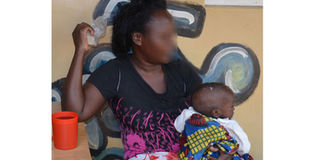Busoga worries over high child malnutrition rates

Sad. A woman takes care of her malnourished child at Nalufenya Children Hospital in Jinja last year. PHOTO BY TAUSI NAKATO
What you need to know:
Danger. The director of Jinja Regional Referral Hospital, Dr Edward Nkurunziza, says malnutrition is sparked by food insecurity.
Jinja health officials have raised the red flag over the rampant malnutrition cases among children in Busoga Sub-region.
The director of Jinja Regional Referral Hospital, Dr Edward Nkurunziza, said the hospital is overwhelmed by the high number of both malnourished children and patients’ turnup.
“We have 289 patients in the children’s hospital yet we have a capacity of 150 beds, which forces us to put two on each bed,” he said at the weekend.
According to World Health Organisation, malnutrition refers to deficiencies, excesses or imbalances in a person’s intake of energy and nutrients.
The symptoms of malnutrition in children include thin body, low energy levels, swollen legs and abdomen.
Others include irritability, sluggishness, excessive crying, dry and flaky skin, dull appearance, and hair loss, among others.
Dr Nkurunziza said malnutrition is sparked by food insecurity.
“Land in Busoga Sub-region is fertile, but it is shameful for people to lack land for growing food because they have rented it out for sugarcane growing, leaving none for cultivation to feed the children,’’ he said.
Dr Nkurunziza also attributed malnutrition cases to domestic violence, divorce, poor child-spacing and fathers who spend money on alcohol.
He added: “Most of the malnourished children we receive are those whose young mothers delivered after separating from their husbands; they go to Kampala to enjoy life and abandon them at their grandparents’ homes who can’t feed them well.’’
The coordinator Uganda Health Communication Alliance, Dr Richard Baguma Tinkasiimire, said children should be fed well right from the time they are conceived to about two years.
Dr Tinkasiimire said parents, including the rich who spend most of their time at work, will continue to have dull children because of poor feeding.
“Most parents leave their children with maids who like rice; and even if you leave everything at home, she will only cook rice and by the time you realise that the child only eats rice, you will not know his or her condition until it degenerates to acute malnutrition,” he said.
Mr Boaz Musiimenta, a senior policy analyst from the Office of the Prime Minister, which coordinates nutrition issues in Uganda, said mothers should breastfeed their babies for six months without anything else.
Ms Susan Tagoola, a mother Daily Monitor interviewed on Sunday at Jinja Children’s Ward with her two-year-old baby suffering from malnutrition, said she is financially incapacitated that is why she was feeding her baby on cassava, posho, rice and potatoes.
If malnutrition is not treated in time, it causes stunted growth, blindness and impaired mental and physical development and compromises one’s immunity, experts have warned.
BACKGROUND
In 2011 and 2012, severe malnutrition hit Namutumba District, leaving close to 20 children dead and more than 100 affected.
According to the 2016 Uganda demographic and health survey, malnutrition tends to be highest among children born to illiterate parents.
A February 2018 report from WHO discovered that around 45 per cent of deaths among children below five years countrywide were linked to undernutrition.


